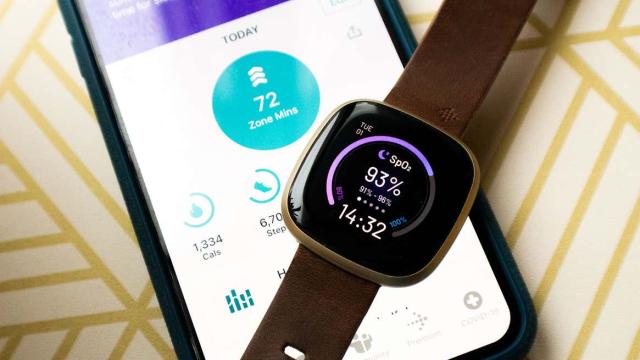Fitbit has been in the sleep tracking game longer than most, and it now appears the company is preparing a new snore and noise detection feature for its smartwatches.
Matter-of-factly dubbed “Snore & Noise Detect”, the feature was spotted in today’s Fitbit 3.42 update by 9to5 Google. Once enabled, Fitbit smartwatches with built-in microphones — such as the Versa 2, Versa 3, and Sense — will be able to monitor nighttime noises from you, your sleep partner, or your environment. Fitbit’s algorithm will then detect what your environment’s baseline noise level is, and look for events that are louder than that baseline, whether it’s snoring or something else.
Results will be graded in terms of what percentage of sleep was spent snoring, and ambient noise levels. For instance, if you or your partner snore less than 10% of the time, you’ll receive a “None to mild” ranking. Moderate snoring is purportedly defined as somewhere between 10-40% of total sleep time, while frequent is more than 40%. Likewise, users will also be able to see a Noise Level chart that’s based on acoustic pressure. (You can see screencap examples in 9to5 Google’s report.)
There appear to be some caveats, however. For instance, the algorithm may not be able to differentiate whether you or your sleep partner is the one snoring. Also, it may not be able to detect snores if there’s a louder ambient noise overpowering the sound. That includes white noise machines or apps that play sleep soundscapes. As you might expect, the feature is also a huge drain on battery life. Fitbit recommends that users have at least 40% charge before bed, and warns that more frequent charging may be necessary. Also, keep in mind, this isn’t live yet so we don’t yet know if this will be a feature locked behind the Fitbit Premium paywall.
Snoring isn’t the only sleep-related feature Fitbit seems to be working on. The other is called “Your sleep animal”, which appears to be a spin on sleep chronotypes — a system sometimes used by productivity coaches and sleep coaches that uses animal analogs to identify a person’s natural circadian rhythms. In this case, however, the animal profiles seem to correspond to how people sleep, instead of what time they tend to sleep.
Right now, Fitbit has some of the best wearable-based sleep tracking out there — due in part to its devices’ long battery life. On top of identifying time spent in various sleep stages, users can also view how they stack up against other people in their demographic, as well as view their SpO2 levels from the previous night. But while Fitbit initially led in this space, it’s now commonly found on other fitness trackers from companies like Garmin, Polar, and Amazfit. There’s also been some competition from specific sleep and recovery-based wearables like the Oura Ring and Whoop, which go even further into sleep metrics. Samsung, Apple, and Google (via Google Fit) have also both added native sleep tracking, though they’re not quite as in-depth.
This isn’t the first we’ve seen Fitbit experiment with snoring-related features. In January last year, Fitbit offered a limited-time snore tracking beta app to Versa 2 users. At the time, the Versa 2 was the only available Fitbit device with built-in microphones. It’s possible that snore-detection might also play into Fitbit’s attempts to receive FDA clearance for sleep apnea detection features — which has been a long-term goal for the company ever since it first introduced SpO2 sensors in the Fitbit Ionic back in 2017. (Loud snoring is often associated as a symptom of obstructive sleep apnea.)
As mentioned, this feature isn’t available yet. It’s simply something that was spotted in the app’s code and dovetails with Fitbit’s sleep tracking efforts. It’s hard to say when, and for which products, this kind of feature might be publicly rolled out — if it ever is.
